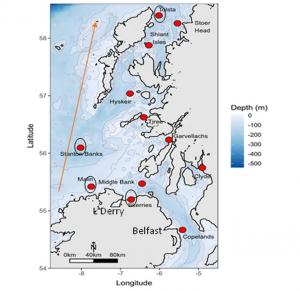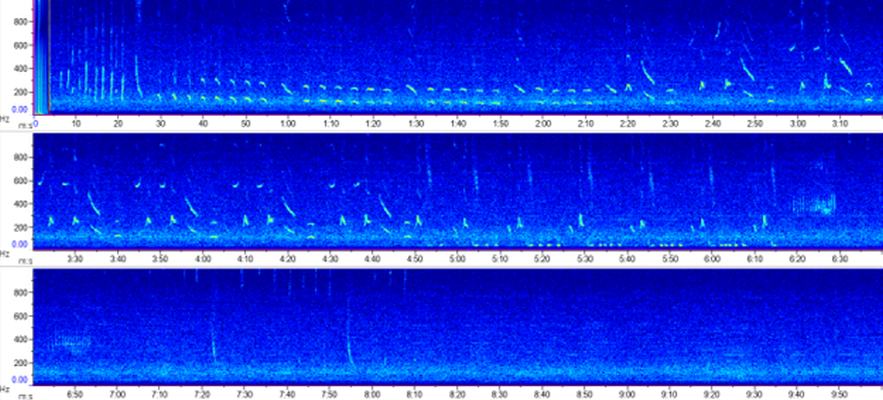A potential migratory corridor for north Atlantic humpback whales has been identified off the coast of Northern Ireland, Ireland and Scotland through a wide-ranging study of whale song.

Male humpback whales produce complex, structured, culturally transmitted songs. Scientists working on the multi-agency Collaborative Oceanography and Monitoring for Protected Areas and Species project (COMPASS) have detected humpback whale song in our regional waters primarily between March and May. The COMPASS project has been funded and supported by the EU's INTERREG VA Programme, managed by the Special EU Programmes Body.
The Agri-food and Biosciences Institute (AFBI) and Queen’s University Belfast (QUB) PhD student Cathy Gibson explains that the purpose of the whale song is thought to be associated with breeding behaviours and can often be heard on tropical breeding grounds, but it is now well established that song is also detected all the way along the migratory route as well as on traditional feeding grounds.
Our regional waters potentially form part of the migratory corridor of north Atlantic humpback whales from two populations, those that breed at Cape Verde off west Africa, and those that breed in the Caribbean Sea.
These whale migrations will be further investigated as part of Cathy’s research. A comprehensive survey of humpback whale song occurrence throughout NW Scotland, the Irish Sea and the Malin Sea will allow us to determine if whales are using this migratory corridor each year.

Humpback whale song can be detected up to 10’s of kms away but this can vary based on water depth and the frequency of the song units, so the whales could be at least 10km from the acoustic detectors and the main potential migration route further offshore.”
The work carried out by AFBI has benefited from a partnership with Scottish collaborators Scottish Association of Marine Sciences (SAMS) and Marine Scotland.
Dr Denise Risch, the marine mammal leader on COMPASS at SAMS, explains how the legacy of these detections will help in future protection of these areas: “These are exciting findings and following the end of the COMPASS project in December the teams across these regions will continue to collaborate with humpback whale researchers across the North Atlantic to use passive acoustics to further investigate humpback whale migration patterns in the wider North Atlantic as well as looking at how noise may affect singing humpback whales in the coastal Northern Irish waters.”The COMPASS project has received match funding from the Department of Agriculture, Environment and Rural Affairs (DAERA, NI), Department of Housing, Local Government and Heritage (DHLGH, RoI) and Scottish Government (Scotland).
Notes to editors:
The Special EU Programmes Body is a North/South Implementation Body sponsored by the Department of Finance and Personnel in Northern Ireland and the Department of Public Expenditure and Reform in Ireland. It is responsible for managing two EU Structural Funds Programmes, PEACE IV and INTERREG VA which are designed to enhance cross-border cooperation, promote reconciliation and create a more peaceful and prosperous society.
The Programmes operate within a clearly defined area including Northern Ireland, the Border Region of Ireland and in the case of INTERREG VA, Western Scotland.
The INTERREG VA Programme has a value of €283 million and aims to address the economic and social problems which result from the existence of borders.
For more information on the SEUPB please visit www.seupb.eu.
For more information on COMPASS please visit https://compass-oceanscience.eu/
AFBI’s Vision is “Scientific excellence delivering impactful and sustainable outcomes for society, economy and the natural environment”.
AFBI’s Purpose is “To deliver trusted, independent research, statutory and surveillance science and expert advice that addresses local and global challenges, informs government policy and industry decision making, and underpins a sustainable agri-food industry and the natural and marine environments”.
AFBI’s core areas:
- Leading improvements in the agri-food industry to enhance its sustainability
- Protecting animal, plant and human health
- Enhancing the natural and marine environment
Latest news
- AFBI issues Nematodirus warning – Spring 2025 11 April 2025
- Managing Nature Based Risks to the UK Economy and Opportunities for Green Finance 08 April 2025
- AFBI Hillsborough host AERA committee 27 March 2025
- The Omics Days Conference 27 March 2025
